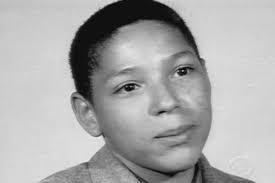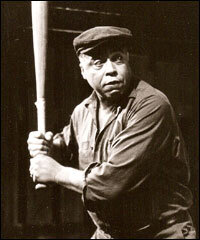
Perhaps the most successful African-American playwright in American history, August Wilson was born Frederick August Kittel on April 27, 1945 in Pittsburgh, Pennsylvania. His parents were Daisy Wilson, who cared for August and his four siblings alongside her work as a cleaning woman, and Frederick Kittel, a German immigrant and baker.
 Young August Kittel went to parochial school near his Hill District home on Bedford Avenue until his parents’ divorce. He, his mother, and his siblings moved from their historically black community to the Oakland neighborhood, which was primarily white. The constant bigotry of classmates led him to change high schools three times by the time he was fifteen, when he withdrew from formal school and began educating himself independently at Pittsburgh’s famed Carnegie Library. In 1962, at age 17, he enlisted in the Army but left after a year of service. After his father’s death in 1965, he took the name August Wilson to honor his mother.
Young August Kittel went to parochial school near his Hill District home on Bedford Avenue until his parents’ divorce. He, his mother, and his siblings moved from their historically black community to the Oakland neighborhood, which was primarily white. The constant bigotry of classmates led him to change high schools three times by the time he was fifteen, when he withdrew from formal school and began educating himself independently at Pittsburgh’s famed Carnegie Library. In 1962, at age 17, he enlisted in the Army but left after a year of service. After his father’s death in 1965, he took the name August Wilson to honor his mother.
 Pittsburgh’s Carnegie Library c. 1935
Pittsburgh’s Carnegie Library c. 1935
The 60s launched Wilson’s writing career. Although he originally planned to work as a poet, by the late 1960s he had formed, with a group of friends, the Centre Avenue Poets Theater Workshop. In 1968, he met collaborator Rob Penny through the CAPTW, and they co-founded the Black Horizon Theater in the Hill District, a community-based Black Nationalist theater company. Penny worked as the playwright while Wilson directed the productions, which were designed to raise awareness of the African-American experience.
Wilson relocated to Minneapolis in 1978, where he began serious work on his own plays. His first play, Jitney, was completed in 1979. Over the next few years, Wilson submitted both Jitney and his second play Fullerton Street to the renowned Eugene O’Neill Theater Center’s National Playwright’s Conference without success, but his third attempt, Ma Rainey’s Black Bottom , was selected in 1982. Through the Conference, Wilson was introduced to the artistic director of the Yale Repertory Theatre, Lloyd Richards, who nurtured trailblazing playwright Lorraine Hansberry, the author of A Raisin in the Sun and the first African-American to have a play produced on Broadway. Richards helped shepherd the development of Ma Rainey’s Black Bottom and ended up directing Wilson’s first six plays on Broadway, including the 1987 Pulitzer Prize-winning Fences. Wilson earned his second Pulitzer in 1990 for The Piano Lesson.
, was selected in 1982. Through the Conference, Wilson was introduced to the artistic director of the Yale Repertory Theatre, Lloyd Richards, who nurtured trailblazing playwright Lorraine Hansberry, the author of A Raisin in the Sun and the first African-American to have a play produced on Broadway. Richards helped shepherd the development of Ma Rainey’s Black Bottom and ended up directing Wilson’s first six plays on Broadway, including the 1987 Pulitzer Prize-winning Fences. Wilson earned his second Pulitzer in 1990 for The Piano Lesson.
From a piano hand-carved by slaves to prison work songs to blues anthems, music sings throughout Wilson’s plays. He said hearing Bessie Smith’s “Nobody in Town Can Bake a Sweet Jelly Roll Like Mine” the first time “was a defining moment: it made him recognize the poetry in the everyday language of black America and gave him the inspiration and freedom to use that language in his own writing.” (Greene Space) He often explained that he got his education from the four B’s: the blues, the art of painter Romare Bearden and the writing of poet Amiri Baraka and writer/poet Jorge Luis Borges. “The foundation of my playwriting is poetry,” he once said, and that influence is obvious from the cadence and power of his dialogue. (Greene Space)
After a decade in Minneapolis, Wilson moved to Seattle in 1990 and continued work on the ten-play series that would become known as The American Century Cycle or The Pittsburgh Cycle. The plays explore the challenges faced by African-Americans in each decade of the 20th century, “beginning with the complex narrative of freedom at the turn of the century and ending with the assimilation and sense of alienation of the 1990s.” (The Greene Space)
A passionate advocate for black representation in the theatre, Wilson explained, “I think my plays offer [white Americans] a different way to look at Black Americans. For instance, in Fences they see a garbageman, a person they don’t really look at, although they see a garbageman every day. By looking at Troy’s life, white people find out that the content of this Black garbageman’s life is affected by the same things—love, honor, beauty, betrayal, duty. Recognizing that these things are as much part of his life as theirs can affect how they think about and deal with Black people in their lives.” He stated that he didn’t write for black or white audiences, but about the black experience, because “…contained within that experience, because it is a human experience,” he said, “are all universalities.” This 1998 interview with Charlie Rose preceded a five-day symposium at Dartmouth University and reveals much of Wilson’s thinking on the topics of race and culture.
The day after Wilson’s 60th birthday in April of 2005, the last play of the Pittsburgh Cycle, Radio Golf, made its debut at the Yale Repertory Theatre. In August of that same year, Wilson revealed his diagnosis of terminal liver cancer. Wilson died October 2, 2005. Peter Marks of The Washington Post wrote that Wilson did not “simply leave a hole in the American theater, but a huge yawning wound, one that will have to wait to be stitched closed by some expansive, poetic dramatist yet to emerge.” (Greene Space)
Actor-director Ruben Santiago-Hudson, who performed in many Wilson plays and won a 1996 Tony Award for Best Featured Actor in a Play for his performance as Canewell in Seven Guitars, said, “August Wilson left such a tremendous body of work for us. He wanted to make sure that our culture did not become history without some life and love and breath in it. He wanted a heartbeat in the stories that we told.” (Fassler)
On October 16, two weeks after Wilson’s death, the owners of the Virginia Theatre on East 52nd street renamed the theatre after him. The August Wilson Theatre is the first Broadway venue to be named for an African-American. In 2006, the African American Cultural Center of Greater Pittsburgh officially became the August Wilson Center for African American Culture.

Sources
https://augustwilsonblog.wordpress.com/tag/the-greene-space/
https://www.biography.com/writer/august-wilson
http://www.august-wilson-theatre.com/plays.php
https://www.centertheatregroup.org/programs/students/learn-about-theatre/august-wilson-monologue-competition/august-wilson-biography
https://www.thegreenespace.org/watch/11-things-you-should-know-about-august-wilson/
https://ronfassler.medium.com/the-magic-of-august-wilson-d6da37dbcfec
